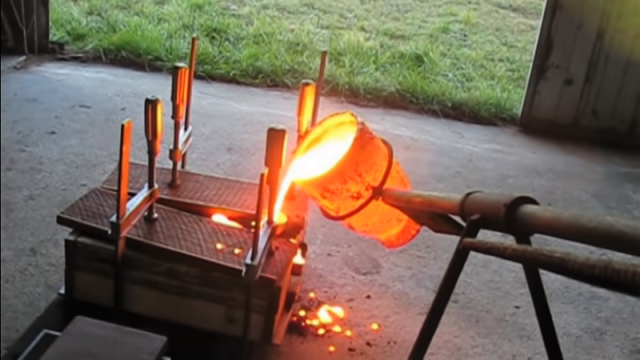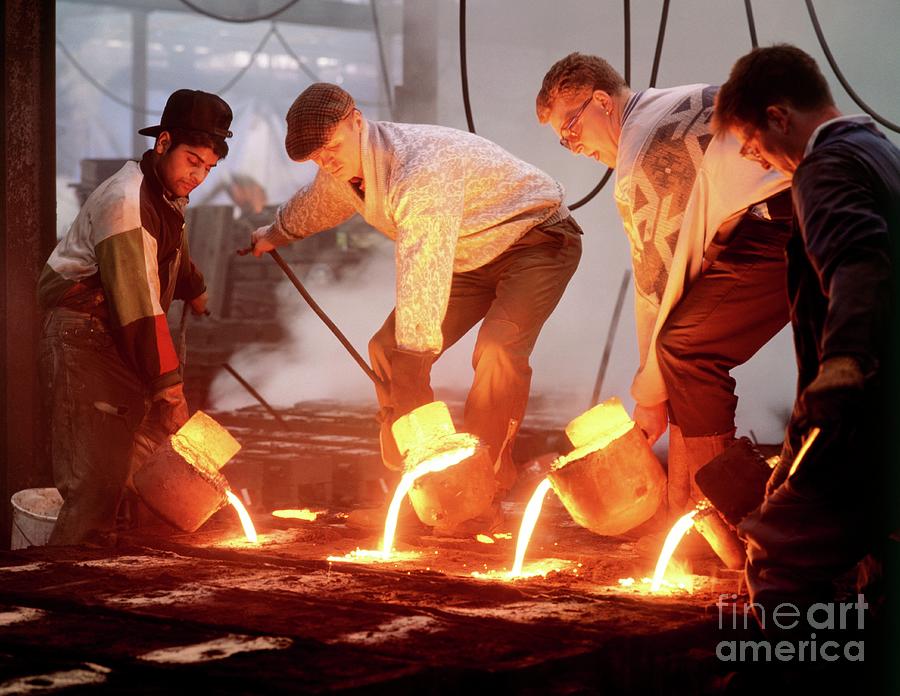Why Modern Metal Casting Foundries Are Integrating 3D Printing for Precision
Wiki Article
A Comprehensive Guide to Metal Casting: Benefits and Providers Provided by Foundries
Metal casting is a vital procedure in different sectors, using numerous advantages through the solutions of shops. These facilities transform liquified metal into specific and resilient components, dealing with details customer demands. By utilizing innovative innovations, shops guarantee high quality and performance in production. Nevertheless, the intricacies of metal casting and the diverse strategies involved raise crucial inquiries about its role in contemporary production. What innovations lie ahead in this necessary area?Understanding the Metal Casting Process
The metal casting process is a basic strategy utilized in producing to create complex shapes and components. This method includes putting molten metal right into a mold and mildew designed to develop the wanted things. The procedure begins with pattern development, which serves as a design template for the mold. Aluminum Foundry. Various materials, such as sand, metal, or ceramic, are made use of for mold-making, relying on the certain demands of the casting
Once the mold and mildew is ready, molten metal is poured right into it and enabled to cool and solidify. After solidification, the mold is removed, disclosing the cast part. Numerous methods, including sand casting, financial investment casting, and die casting, are employed, each matched to different applications and products. Quality control measures, such as inspections and screening, are important to guarantee the end product fulfills specs. Overall, the metal casting procedure plays an essential role in generating parts for sectors ranging from automotive to aerospace.
Trick Advantages of Metal Casting
Metal casting supplies considerable benefits that make it a favored production method in numerous markets. Its layout versatility and accuracy enable elaborate shapes, while cost-efficient mass production improves efficiency. In addition, the adaptability and strength of materials made use of in casting add to the resilience of the end products.Design Versatility and Precision
Launching amazing layout versatility and precision, metal casting enables developers and designers to create complex forms and features that would certainly be challenging or difficult to achieve with other making approaches. This capability allows the manufacturing of complex geometries, inner structures, and fine information that boost product performance and visual appeals. In addition, numerous casting strategies, such as sand casting, investment casting, and pass away casting, give additional choices for customization, fitting varied material properties and job needs. The flexibility of molds allows alterations during the style phase, enhancing the change from concept to final item. Ultimately, metal casting sticks out for its ability to deliver high-precision elements, making it an important process in sectors varying from automotive to aerospace and past.Economical Mass Manufacturing
Economical mass production stands as one of the main advantages of metal casting, enabling manufacturers to produce huge amounts of elements at a lower cost per device. This effectiveness occurs from the ability to develop detailed molds that can be reused multiple times, significantly decreasing setup and functional costs. In addition, metal casting procedures, such as sand casting and die casting, enable high throughput, making it practical to meet the needs of massive manufacturing runs. The minimized material waste and power consumption better enhance price savings, making metal casting an attractive alternative for industries requiring bulk parts. In general, the cost-effective nature of metal casting settings it as a preferred technique for manufacturers going for economic effectiveness in their manufacturing processes.Product Adaptability and Strength
Among the standout qualities of metal casting is its remarkable product flexibility, which permits making use of a broad array of metals and alloys. This flexibility enables manufacturers to pick materials that finest suit their particular applications, from light weight aluminum and bronze to iron and steel. Each metal uses distinct residential properties, consisting of differing degrees of strength, rust resistance, and thermal conductivity. Metal casting can create components that satisfy rigid efficiency requirements across diverse markets, such as auto, aerospace, and construction. Additionally, the strength of cast steels can be boosted through different treatment procedures, making sure sturdiness and durability. Metal Casting. Generally, the mix of product convenience and inherent strength makes metal casting a preferred choice for producing premium elementsSorts Of Metal Casting Methods
Metal casting incorporates a range of strategies that deal with various production demands and product homes. Typical techniques include sand casting, which utilizes a sand mold for intricate forms, and financial investment casting, understood for its precision and surface area finish. Die casting is an additional strategy that utilizes high-pressure injection of molten metal right into mold and mildews, suitable for automation of small components.Covering molding provides a faster alternative, utilizing a resin-coated sand to produce thin-walled mold and mildews, while shed foam casting enables elaborate designs without the need for a core.
Furthermore, constant casting is used for creating lengthy sections of metal, such as sheets or bars, by strengthening liquified metal in a constant procedure. Each technique presents distinct benefits and is selected based on factors like the needed information, manufacturing quantity, and product kind, making sure superior results in metal construction throughout numerous industries.
The Role of Foundries in Metal Casting
Shops play an essential function in the metal casting process, functioning as the facilities where liquified metal is changed into finished products. These specialized facilities are geared up with the needed devices and modern technologies to deal with various steels, guaranteeing high-quality outcomes. Shops are liable for numerous crucial functions, consisting of thawing the metal, putting it into mold and mildews, and enabling it to strengthen.In addition, they maintain strict safety and ecological criteria to safeguard workers and lessen ecological effect. Competent specialists and engineers collaborate to enhance casting procedures, boosting effectiveness and decreasing waste. Factories additionally engage in quality assurance steps, ensuring that the final items satisfy certain tolerances and requirements. This quality control is necessary for markets that count on precise elements, such as auto and aerospace. Consequently, foundries add considerably to the total production landscape, allowing technology and development across different sectors.
Customized Metal Casting Solutions
Custom metal casting solutions use customized style remedies that fulfill certain customer requirements. These services also give material choice proficiency, ensuring the appropriate metal is selected for the wanted application. Such adaptability and knowledge enhance the general top quality and performance of the final product.
Customized Design Solutions
Customized layout services in metal casting supply manufacturers with the versatility to develop parts that satisfy details performance and aesthetic demands. Factories supply tailored solutions that allow clients to specify dimensions, shapes, and surface area finishes to accomplish wanted outcomes. This modification process commonly consists of collaboration between designers and designers, making sure that the last products align with functional requirements and industry standards. Advanced modern technologies, such as computer-aided style (CAD) and simulation software, allow accurate modeling and screening of components before manufacturing, enhancing and reducing mistakes efficiency. By leveraging tailored style remedies, organizations can enhance capability while reducing waste and prices, ultimately causing a much more one-upmanship in the market. This adaptability is important for industries needing unique applications and specs.Material Choice Proficiency
When choosing materials for metal casting, knowledge plays an important function in making certain that the appropriate choice go right here straightens with both efficiency demands and cost-effectiveness. Foundries employ skilled professionals that understand the residential properties of various steels and alloys, enabling them to advise optimal materials for specific applications. Aspects such as toughness, rust resistance, and thermal conductivity are meticulously thought about to satisfy the customer's needs. Furthermore, market trends and advancements in material science educate these choices, enabling factories to remain competitive. By leveraging their experience, shops can aid customers in steering via complicated product choices, ultimately causing enhanced product top quality and reduced manufacturing prices. This customized understanding is important for attaining successful outcomes in custom-made metal casting services.Quality Assurance in Metal Casting
Quality control in metal casting is critical to guarantee that the end products satisfy the called for specs and efficiency standards. Factories use a variety of approaches and strategies to assure the highest quality of cast components. This process begins with stringent material evaluations, confirming that raw products conform with sector criteria. Throughout the casting procedure, real-time surveillance and screening are carried out to examine specifications such as temperature, mold integrity, and dimensional accuracy.
Applications of Metal Castings Throughout Industries
Metal castings play a crucial role in different sectors, functioning as the backbone for many applications. In the vehicle market, cast components such as engine blocks and transmission real estates are essential for automobile performance and integrity. The aerospace industry relies on precision spreadings for critical components that assure safety and efficiency in flight. Additionally, the building market utilizes metal spreadings for fixtures, fittings, and structural aspects, improving the longevity of structures and framework.Additionally, the energy sector take advantage of castings used in turbine blades and various other equipment essential for power generation - Metal Foundry. The medical area additionally makes use of metal spreadings in devices and instruments, showing the convenience of this production process. Overall, metal castings are essential to the performance and improvement of varied sectors, showcasing their significance in contemporary innovation and facilities advancement
Often Asked Concerns
What Products Are Frequently Utilized in Metal Casting?
Typical materials utilized in metal casting include aluminum, iron, brass, steel, and bronze. Each product uses special buildings ideal for numerous Web Site applications, enabling makers to choose the best option based upon weight, corrosion, and toughness resistance.For how long Does the Metal Casting Refine Commonly Take?
The metal casting procedure usually takes several hours to a couple of days, depending upon aspects such as the complexity of the layout, kind of metal utilized, and the specific casting method utilized by the shop.
What Is the Environmental Influence of Metal Casting?
The ecological impact of metal casting includes energy usage, exhausts, and waste generation. Foundries commonly apply measures to reduce these impacts, such as reusing products and making use of cleaner technologies to decrease their environmental impact.Can Metal Casting Be Provided For Small-Scale Projects?
Metal casting can indeed be carried out for small-scale jobs. Different factories provide to such demands, supplying tailored solutions that accommodate limited production runs while maintaining quality and accuracy in the last items.What Are the Precaution in Metal Casting Foundries?
In metal casting foundries, precaution include personal safety devices, appropriate ventilation, training on devices use, emergency procedures, regular upkeep checks, and adherence to sector safety and security criteria to lessen dangers related to molten metal and hazardous products.In addition, metal casting procedures, such as sand casting and die casting, allow for high throughput, making it possible to meet the needs of large manufacturing runs. One of the standout attributes of metal casting is its exceptional material adaptability, which enables for the use of a wide array of alloys and metals. Additionally, continual casting is used for producing lengthy areas of metal, such as bars or sheets, additional hints by solidifying liquified metal in a constant process. Factories play a critical duty in the metal casting procedure, serving as the centers where molten metal is changed into finished items. Common products utilized in metal casting consist of light weight aluminum, iron, steel, brass, and bronze.
Report this wiki page